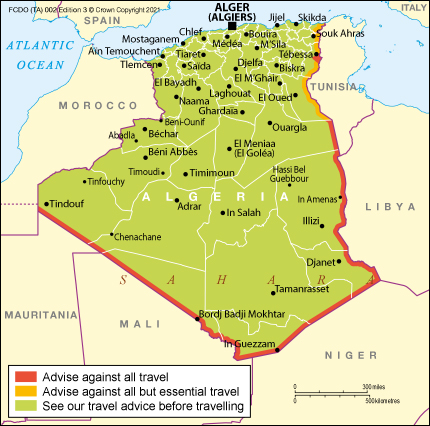Algeria
Summary

The Foreign, Commonwealth & Development Office (FCDO) advises against all travel to areas within:
- 30km of the borders with Libya, Mauritania, Mali and Niger
- 30km of the border with Tunisia in the provinces of Illizi and Ouargla and in the Chaambi mountains area
The FCDO advises against all but essential travel to within 30km of the remainder of the border with Tunisia
COVID-19 entry restrictions for Algeria
Before you travel, check the ‘Entry requirements’ section for Algeria’s current entry restrictions and requirements. These may change with little warning. Monitor this advice for the latest updates and stay in contact with your travel provider.
Travelling from and returning to the UK
Check what you must do to travel abroad and return to England, Scotland, Wales or Northern Ireland.
If you plan to pass through another country to return to the UK, check the travel advice for the country you’re transiting.
ItIf you’re planning to travel to Algeria, find out what you need to know about coronavirus there in the Coronavirus section.
During the COVID-19 pandemic, it is more important than ever to get travel insurance and check it provides sufficient cover. See the FCDO’s guidance on foreign travel insurance.
For information about COVID-19 vaccines, see the Coronavirus page.
There is a possibility of an increased threat against Western interests, including against British nationals. You should remain vigilant and keep up to date with the latest developments, including via the media and this travel advice.
TheCountry-wide Arabdemonstrations Leagueand Summitother willforms beof heldprotest, inwhich Algiersbroke fromout 1-2across November.Algeria You should expect some disruption to transport in AlgiersFebruary ahead2019, ofwere andsuspended duringdue theto Summit,COVID-19. includingGatherings roadremain closures at short notice.
Demonstrations and other forms of protest, are subject to various restrictions. However, different types of protests occur frequently and can take place at short notice throughout the country, particularly on Tuesdays and Fridays. You should take precautions for your personal safety by avoiding political gatherings and demonstrations.
See Political situation
Terrorists are likely to try to carry out attacks in Algeria, including kidnappings. Terrorist attacks have focused on the Algerian state, but attacks could be indiscriminate and include foreigners. There’s also a risk that lone actors could target foreigners. You should be vigilant at all times and take additional security precautions, especially in towns and cities; the southern, Libyan and Tunisian border areas; rural and mountainous areas in the north; and the Sahara. See Terrorism
The Algerian authorities devote considerable resources to the safety of foreign visitors. If you’re travelling independently, you should notify the Ministry of Foreign Affairs or local authorities of your plans. See Local travel
When moving around Algiers and the other main cities, avoid areas that you don’t know, especially after dark. Travelling in rural areas and at night is particularly risky and it’s always advisable to travel with a reputable guide or companion in these areas. Avoid travel by road at night outside the major cities and motorways. See Crime and Local travel
You will need to get a visa before you travel. See Visas
If you’re abroad and you need emergency help from the UK government, contact the nearest British embassy, consulate or high commission. Consular support is severely limited in parts of Algeria where the FCDO has existing advice against all travel, and limited where the FCDO has existing advice against all but essential travel (see above).
The Overseas Business Risk service offers information and advice for British companies operating overseas on how to manage political, economic, and business security-related risks.
Update history
2025-11-28 16:40
Removal of information about regional risks.
2025-06-13 12:38
Ongoing hostilities in the region and between Israel and Iran could escalate quickly and pose security risks for the wider region (‘Safety and security’ page).
2025-04-25 15:56
Information about travelling with children (‘Entry requirements’ page).
2024-10-26 08:17
On 26 October Israel carried out military action against Iran (‘Safety and security’ page)
2024-09-29 00:33
Updated information on the Conflict affecting Lebanon (Safety and Security Pages)
2024-05-02 16:47
This travel advice has been rewritten to make it easier to read and understand.
2024-04-26 12:36
Removal of some language on military activity in the region (‘Summary’ page).
2024-04-19 14:59
Information on explosions in Iran, and unconfirmed reports of explosions in Syria and Iraq (‘Summary’ page).
2024-04-14 09:16
13 April 2024 – drones and missiles fired from Iran into Israel (‘Summary’ page)
2024-04-12 20:05
Information on regional risks (‘Safety and security’ page).
2024-03-18 11:33
Removal of the US security alert about the Sahara Marathon (‘Summary’ and ‘Terrorism’ pages).
2024-02-16 12:44
Information on a US security alert warning of increased risk of kidnapping of Western nationals near camps in Tindouf region ahead of the Sahara Marathon 2024 planned for 28 February (‘Summary’ and Terrorism’ pages).Additional information on the visa upon arrival scheme for designated airports in the south of Algeria (‘Entry requirements’ page).
2023-07-25 18:50
“Updated information on wildfires across some parts of northern Algeria, including in populated areas (Summary page)”
2023-07-18 09:15
Removal of information about beach and hotel closures during the Pan Arab Games which took place from 5 to 15 July (‘Safety and Security’ page).
2023-07-04 15:13
Information about beach and hotel closures during the Pan Arab Games taking place from 5 to 15 July (‘Safety and Security’ page).
2023-06-22 10:34
Information about the global terrorism risks to British nationals abroad on all FCDO travel advice pages
2022-11-04 09:27
Addition of information on the lifting of Covid-related entry restrictions (‘Coronavirus’ page).
2022-10-27 16:45
Addition of information on transport disruptions in Algiers due to the Arab League Summit (‘Summary’ page).
2022-08-18 11:21
Addition of information on obtaining proper documentation before leaving Algeria with old or antique items (‘Local laws and customs’ page)
2022-05-10 16:14
Updated information on the likelihood of terrorist attacks in Algeria (‘Summary’ and ‘Terrorism’ pages)
2022-03-17 16:44
Updated information on Algeria’s entry requirements (‘Coronavirus’ and ‘Entry requirements’ pages)
2022-03-16 11:45
Update to information on coronavirus restrictions and entry requirements (‘Coronavirus’ and ‘Entry requirements’ pages)